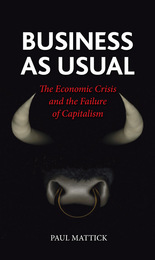
Business As Usual reveals how American capitalism has been promoted in the most ephemeral of materials: public service announcements, pamphlets, educational films, and games—what Caroline Jack calls “sponsored economic education media.” These items, which were funded by corporations and trade groups who aimed to “sell America to Americans,” found their way into communities, classrooms, workplaces, and onto the airwaves, where they promoted ideals of “free enterprise” under the cloaks of public service and civic education. They offered an idealized vision of US industrial development as a source of patriotic optimism, framed business management imperatives as economic principles, and conflated the privileges granted to corporations by the law with foundational political rights held by individuals. This rhetoric remains dominant—a harbinger of the power of disinformation that so besets us today. Jack reveals the funding, production, and distribution that together entrenched a particular vision of corporate responsibility—and, in the process, shut out other hierarchies of value and common care.

The recent global economic downturn has affected nearly everyone in every corner of the globe. Its vast reach and lingering effects have made it difficult to pinpoint its exact cause, and while some economists point to the risks inherent in the modern financial system, others blame long-term imbalances in the world economy. Into this debate steps Paul Mattick, who, in Business as Usual, explains the global economic downturn in relation to the development of the world economy since World War II, but also as a fundamental example of the cycle of crisis and recovery that has characterized capitalism since the early nineteenth century.
Mattick explains that today’s recession is not the result of a singular financial event but instead is a manifestation of long-term processes within the world economy. Mattick argues that the economic downturn can best be understood within the context of business cycles, which are unavoidable in a free-market economy. He uses this explanation as a springboard for exploring the nature of our capitalist society and its prospects for the future.
Although Business as Usual engages with many economic theories, both mainstream and left-wing, Mattick’s accessible writing opens the subject up in order for non-specialists to understand the current economic climate not as the effect of a financial crisis, but as a manifestation of a truth about the social and economic system in which we live. As a result the book is ideal for anyone who wants to gain a succinct and jargon-free understanding of recent economic events, and, just as important, the overall dynamics of the capitalist system itself.

READERS
Browse our collection.
PUBLISHERS
See BiblioVault's publisher services.
STUDENT SERVICES
Files for college accessibility offices.
UChicago Accessibility Resources
home | accessibility | search | about | contact us
BiblioVault ® 2001 - 2024
The University of Chicago Press









